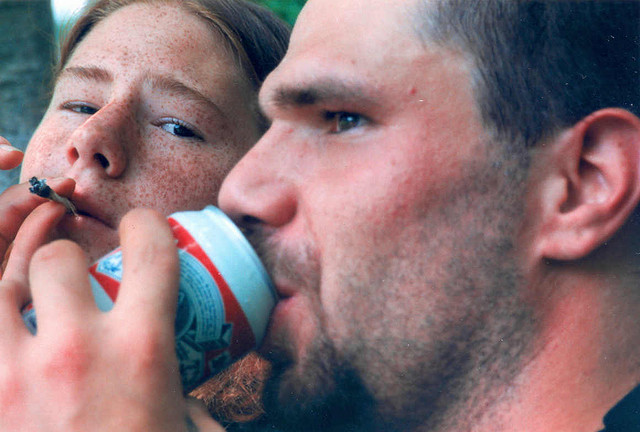The last time I smoked marijuana was August 30, 2009.
I can remember the date so clearly because I had just returned home from a four day silent meditation retreat with Stephen Archer. I was five months pregnant and in a difficult and fractious relationship with the father.
I had poor boundaries and he had addiction issues—it was a classic co-dependent relationship.
I came home to find my then-partner drinking and smoking with his best buddy, an ex-gang member I had a good rapport with. As I stood there, flush with clarity and stillness from the retreat, it seemed there were only two options: I could own up to the truth, which was that this was not the life I wanted to be living, this was not the life I wanted for my baby, thus setting a strong boundary even if it meant accompanying emotional turmoil.
Or, I could go with the flow and just accept it how it was.
My desire for conflict avoidance and avoidance of emotional turmoil was still greater than my desire for truth and so I acquiesced. As a way of dealing with the turbulent feelings oscillating in my belly—feelings I didn’t want to feel let alone deal with—I joined my ex-partner and his buddy in one or two tokes of a joint.
That action had the desired result: I detached from my angst, released my tension and dropped into The Now—albeit a warped version of the Now where emotional truth doesn’t matter—and became part of the crew.
No conflict, just oneness and presence. What’s not to love?
But I knew what was not to love. I knew exactly what it was costing me every time I smoked weed instead of staying with difficult emotions and making tough choices.
My weed smoking had been almost non-existent since getting pregnant; being pregnant was the perfect motivation to finally stop as it’s sometimes easier to do the best thing for another than it is for oneself. So I can also remember the only one other time I smoked weed while pregnant with crystal clarity.
My ex-partner and I were on holiday with his daughter in the town where he was living when we met. He was in the habit of leaving me to babysit and heading off to the pub at about 4pm each day (not much of a holiday).
Again, unable to deal with the conflict—and anytime I tried to set a boundary or establish my needs or desires, there was serious conflict—I went along with it while burning up on the inside. At this point in the holiday I was desperate. Feelings and emotional turmoil were threatening to consume me and I was struggling to keep my head above water while living in a constant state of tension: fight, flight or freeze.
So I did the last desperate thing and found my partner’s stash and smoked a hit on his pipe. With an instant sense of detachment from turbulent feelings, I dropped deep into the Now and felt total relief.
This pattern of using marijuana to escape from tension and difficult emotions was a pattern I was aware of though. I had become aware of it before I choose to became pregnant, two years into this difficult relationship. When I smoked weed, I brought all my yoga witnessing skills to the pipe and observed myself in action, just like I would on the mat.
Through this minute study of my weed-smoking habits, I’d figured out that there were two motivations I had for smoking weed.
One was self-medication: it helped me cope with life when I felt like I was drowning in tension and agitation. The second was party-mode…a feeling of why the hell not, it will be fun changing my consciousness. The more yoga and meditation I did, the less I smoked in party-mode. There just didn’t seem to be much point in changing my consciousness using drugs when it happened naturally through practice. Instead, it was becoming starkly obvious that the only times I smoked weed was to alleviate the excruciating tension I was experiencing, and so avoid the truth of the moment and avoid my feelings.
This I observed in detail as well. I could feel the tension building inside of me as my unexplored and unexpressed truth turned me into a brittle and frigid shell of a woman. I knew this wasn’t who I was, but I couldn’t relax and let go into my authentic self. I didn’t know how…even with yoga and meditation. The feeling of being trapped inside this prison of tension became worse and worse until the only relief was smoking weed. I held off as long as I could—sometimes for days—until I couldn’t see any other way out. I didn’t know how to shift my state of being and release into the relaxed, fun-filled, joyous woman I knew I was.
So I smoked. And as I smoked, I observed my internal processes.
Invariably, there was an instant sense of relief as I let go on some deep level. I suspect it was shifting my nervous system out of fight, flight or freeze. This seemed to be because the act of smoking detached me from my emotions—they were no longer dictating my state of being or my nervous system response to life.
In the detachment there would often be an insight that would arise about what I had been experiencing and why I had been in that awful state of being. This was useful, and for a stage, I justified my continued weed-smoking because of these insights.
However, in time, I also observed that these insights were only intellectual. And that every time I smoked weed I missed an opportunity to deal with the root of the issue that was seeking to surface and causing me all the angst. As soon as I smoked, that root issue would recede and drop down beneath the surface again, until the next time it brought me back into a state of tension.
I figured out that I was short-cutting my emotional development. I was preventing myself from truly moving forward, while giving myself short-term relief.
If I wanted to allow those feelings to surface and release properly, I had to stop smoking weed altogether and go through the darkness. Being pregnant gave me that opportunity because suddenly it wasn’t about just me anymore, it was about the health of my child.
Smoking a few tokes after the four day silent retreat provided a stark contrast: I’d gone from a true state of clarity and insight into a drug-induced haze where insight might arise but at a cost. I knew in that moment that I had compromised my integrity and taken the easy way out, that I hadn’t had the courage to face down the dragon in the moment. And maybe that wasn’t the moment, with my ex-partner’s friend staying for the weekend.
Maybe it was, in some way, the best thing at that time. Who knows?
But I never smoked again. I remained smoke free for the rest of the pregnancy.
At seven months pregnant, I left my partner. I’d finally had enough of the smoking and drinking and put my foot down. After a week or so apart, he came back with promises of sobriety. I was clear – if we were bringing up this child together, no more smoking.
That lasted a blissful month and our relationship was completely different in that time. It finally lived up to the potential I had always focused on. No more mood swings, no more verbal and emotional abuse, just a steady and present love. It didn’t last though—by the time I was nine months pregnant, my partner had succumbed to his demons and the smoking, mood swings and verbal and emotional outbursts had returned.
After the birth, I stayed smoke free, even though life was tough. Four months of facing my own demons without a crutch and making it through the other side had given me a taste of what was possible. I saw how allowing emotions to fully surface and listening to the information they had to share was a valuable gift, even though it could be extraordinarily painful.
I’d learned that I was strong enough to make it through the darkness.
But more than that, there was no way I was going to be around my baby stoned. It was non-negotiable. I knew that a baby’s consciousness is a precious thing, and at that stage of life, babies are completely merged with the consciousness of their primary caregivers. Differentiation into ‘me and the other’ doesn’t happen until the child is about two years old.
In my mind, that meant if I was stoned, my child would experienced a stoned consciousness too. He would experience detachment and disassociation from emotions. There was no way I was setting up those neural patterns in his brain.
So I stayed smoke free.
Eleven months later, away from my child for the weekend at a 40th birthday party with my partner, there was plenty of weed smoking going on. It was a party and I wouldn’t see my child for a day or two so there was no material reason not to smoke. And then someone handed me the a joint. As I was holding it and pausing to consider, the joint went out.
Still in contemplation, I put it in my pocket.
Did I want to smoke that joint, after more than a year smoke-free?
I pondered that question for about three hours, wandering sober around the party, as everyone else got drunker and higher. Booze, weed, acid, ecstasy…it was all going on. Finally, when someone beside me groaned about running out of weed, I retrieved the almost-roach and handed it over.
Here, I said. Smoke this. It’s time for me to go home.
And it was. The party was disintegrating into a drug haze and there was no one on my level of consciousness to engage with. My partner, stoned and high on acid, unleashed a torrent of abuse on me as I walked away. No surprise there. But I didn’t care anymore. This was not who I was anymore. I didn’t need to get high to relax, connect and have a fun time. Not anymore. I’d learned, the hard way, how to dive into the darkness and face my dragons.
It’s been over six years now, and sporadically, opportunities to smoke present themselves. I’m still not interested. Although I do have dreams sometimes that I’m high and it always freaks me out. Being stoned has become a non-desirable state of being.
Yet I also understand intimately why people smoke and I understand the gift that smoking can provide. It offers relief from a difficult times.
Like anything in life, if you bring full awareness to the process—when you smoke, why you smoke, what happens when you smoke, how it affects you, how it affects the people around you, what it feels like afterward—a deeper state of consciousness begins to arise.
Out of that deeper state of consciousness, new decisions are made.
This means that stopping smoking isn’t necessarily about will-power, or about being good, or about resisting temptation. It’s about being fully present to the experience when the desire arises. it’s about being as conscious as you can about the entire process. As your level of consciousness increases, the desire to smoke fades away.
It may even be that higher states of consciousness and smoking weed are mutually exclusive simply because the need for smoking drops totally away. At parties now, although I’m totally sober, I often feel like I’m stoned—the good aspects of it.
As it turns out, I don’t need to smoke to reap it’s benefits anymore.
They’re embedded in my consciousness.
And that’s a pretty awesome thing.
More awesome from Kara-Leah:
How to Break a Pattern of Attracting Emotionally Unavailable People.
Author: Kara-Leah Grant
Editor: Renée Picard
Image: Elvert Barnesat Flickr









Read 9 comments and reply